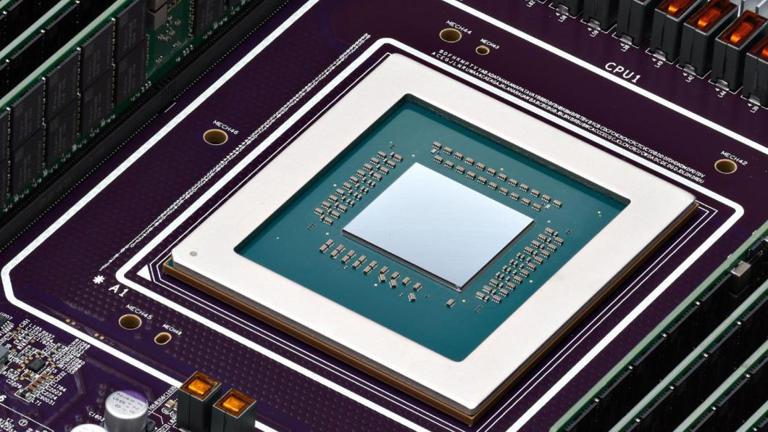AI Chip Regulation Upgrade: US Plans to Appoint Google Microsoft as Gatekeepers
With the rapid development of AI technology, AI chips, as its core components, have become the focus of technological competition among countries. The United States is concerned that without strict regulation, AI chips could be used for improper purposes or even pose a threat to national security. Additionally, the US hopes to consolidate its dominant position in the global AI industry chain through certain measures.
Therefore, the US government is considering introducing new regulations to strengthen the oversight of artificial intelligence (AI) chips and intends to place technology giants such as Google and Microsoft in the role of "gatekeepers" for global AI chip distribution. This initiative aims to ensure the US's leading position in AI technology while preventing the leakage of sensitive technologies.
 01 Specific Regulations and Impacts
01 Specific Regulations and Impacts
1. Gatekeeper Role: According to British media reports, technology companies such as Google and Microsoft will be designated as "gatekeepers" for AI chip distribution. Without the need for a license, they can provide AI functions in overseas cloud services under the premise of complying with strict reporting requirements and blocking access from specific national entities (such as China). These companies must report key information to the US government, including customer details, business activities, access controls, and network security measures, to ensure that AI chips are not used for improper purposes.
2. Exempted Countries: The new regulations will exempt 19 allied countries, including the Netherlands and Japan, allowing them unrestricted use of AI chips or their functions. However, countries subject to nuclear embargoes, such as Russia, Iran, and Venezuela, will continue to be banned from purchasing US AI semiconductors.
3. Licensing System: Companies that do not qualify as "gatekeepers" can apply for a license to import a limited number of high-end AI chips from manufacturers such as NVIDIA and AMD. This system aims to balance the global circulation of technology with the protection of national security.
4. Export Controls: The new regulations will further refine restrictions on American investments in China's semiconductor and microelectronics, quantum information technology, and artificial intelligence fields. These restrictions include notifying the US Treasury Department, conducting due diligence, voluntarily disclosing information, responding promptly to inquiries, and providing required documentation.
02 Potential Impacts and Concerns of the New Chip Regulations
This initiative may raise significant concerns among the US's partners and allies worldwide, who worry that the US will act as a unilateral arbiter in deciding who can access crucial AI chips. In simpler terms, some countries fear that this action may lead to the fragmentation and unequal development of global AI technology. To address this challenge, these countries may adopt corresponding policy measures to strengthen their own technological research and development and industrial chain construction.
At the same time, the implementation of the new regulations may exacerbate technology blockades, leading to instability in the global supply chain. Especially for countries and regions that rely on US AI chip technology, they may face the risk of supply chain disruptions. Furthermore, while the US attempts to curb China's rapid development in AI technology through this measure, it may also trigger countermeasures from other countries, resulting in a more intense competitive landscape in the global chip market.
03 Related Industry Trends
● AI Chip Market Size: According to data from the Qianzhan Industry Research Institute, the global AI chip industry market size will reach $90.2 billion in 2024, with a compound annual growth rate of 24.55% over the next five years. AI chips are widely used in AI model training, agent training, consumer electronics, automotive electronics, and other fields.
● US Restrictions on China: Apart from the new AI chip regulations, the US has also imposed new restrictions on China's access to chips and key components of artificial intelligence. These restrictions include adding an additional 140 Chinese entities to the entity list and implementing additional restrictions on the sale of high-bandwidth memory (HBM) and chip manufacturing equipment.
04 Conclusion
As AI technology continues to advance and expand its application fields, the importance of AI chips will become increasingly prominent. The US's proposed new AI chip regulations, assigning technology companies such as Google and Microsoft as global distribution "gatekeepers," not only reflect the intensifying competition for control over key core technologies in the current international situation but may also have far-reaching impacts on the global supply chain and technological development. In the future, with the implementation of the new regulations and the reactions of global parties, the competition and cooperation landscape in this field may undergo new changes.
Hot Electronic Components
Explore recent hot chip models and enhance your electronics projects with new high-performance components. For more IC models, visit Conevo, a trusted distributor of electronic parts.
● The STM32F407VGT6 is a high-performance 32-bit ARM Cortex-M4 microcontroller with 1 Mbyte Flash and 192+4 KB SRAM, offering a wide range of peripherals and connectivity options for embedded systems development.
● The BYG20J-E3/TR is a high-speed avalanche SMD rectifier diode from Vishay, featuring a 600V reverse voltage, 1.5A average forward current, and an ultrafast reverse recovery time of 75ns, suitable for high-frequency rectification in power supplies, inverters, converters, and as freewheeling diodes in various applications.
● The ADA4941-1YRZ is a low-power, low-noise differential driver designed to drive ADCs up to 18 bits in power-sensitive systems, featuring a wide input voltage range, rail-to-rail output, high input impedance, and user-adjustable gain, suitable for a variety of low-power applications including battery-operated devices and single-supply data acquisition systems.
Website: www.conevoelec.com
Email:info@conevoelec.com









